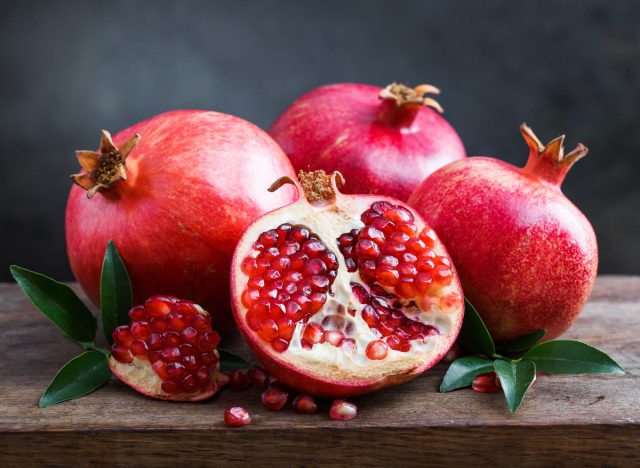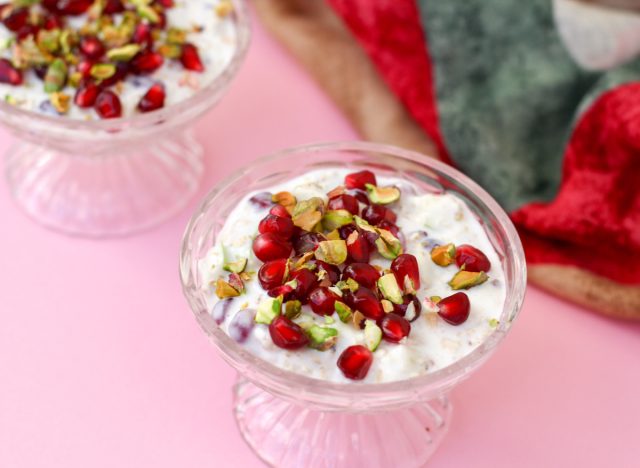You likely think of fruit as a healthy food because of its vitamin, mineral, and antioxidant content. But did you know that fruit can also support your weight loss efforts? Even though some popular diets may tell you to avoid carbohydrates—including fruit—to enhance weight loss, this food is an important source of many nutrients and can absolutely be part of a weight-loss diet. But what is the #1 best fruit to eat for weight loss? We have our top pick for you to add to your cart on your next grocery store run, so listen up.
By practicing reasonable portions and pairing your fruit with a source of fat and protein, you can create a well-rounded, nutritious diet that’s ideal for losing weight. Keep reading to learn all about the #1 best fruit to eat for weight loss, along with how it’s a beneficial addition to your diet. And when you’re finished, be sure to check out 10 Best Breakfast Foods for Losing Weight & Gaining Muscle.
How can fruit help you lose weight?

All fruit contains fiber, a nutrient that can slow the release of sugar into your bloodstream. This characteristic allows for more stable blood sugar levels, which can improve weight loss. Not to mention, you may notice more stable energy as a result, too. Fiber also has a high satiety value, meaning it allows you to feel fuller after a meal. This feeling of fullness following meals and snacks can keep you from overeating throughout the day, aiding in your weight loss goals.
Certain types of fiber serve as a food source for the healthy bacteria in your gut, called probiotics. Some research indicates probiotics improve the integrity of the gut and may be able to reduce the likelihood of obesity. Lastly, fruit is relatively low in calories compared to other food groups, allowing it to add volume and nutrients to your diet without costing you many calories. For all of these reasons, fruit can help you lose weight and should be considered an important component of a weight-loss diet.
What is the best fruit to eat for weight loss?

The best fruit to eat for weight loss is pomegranate. Eating the seeds is where you’ll get the most benefit, as all nutrients remain intact. However, pomegranate juice is a source of many important nutrients, too. Not only is the lightly sweet and sometimes tart fruit an enjoyable flavor, but the texture makes it unique compared to most other fruits. Here’s why you should be eating more pomegranate seeds if you are trying to lose weight.
1. It’s packed with fiber
Just one cup of pomegranate seeds contains 6 grams of filling fiber. While all fruits will provide fiber, the amount of fiber you get per serving of pomegranate ranks amongst the highest of all fruits. Eating a high-fiber diet can improve satiety, reduce overeating, and improve gut health, all factors that can promote weight loss.
2. It comes with a low-calorie count
Although pomegranate is not the lowest-calorie fruit, it only provides about 120 calories per cup of arils. This is a hearty portion of fruit that can serve as the base of a filling snack or add volume to a meal. Including high-volume, low-calorie foods in your meal plan is great for weight loss as they can improve your satiety and allow you to maintain a calorie deficit more comfortably.
3. It promotes fat loss
Pomegranate is most known for its antioxidant properties, but research suggests it may have a positive impact on fat reduction, too. While much of the available research focuses on pomegranate extract, a concentrated source of the fruit, there appears to be fat loss benefits from consuming the whole fruit as well. While more research needs to be conducted to understand the fat loss mechanisms of pomegranate, data seems promising enough to encourage daily consumption of pomegranate and its extracts.
How you can implement this fruit into your weight loss regimen?

The flavor and texture of pomegranate may be unique compared to other fruits, but that doesn’t keep it from being a versatile food. Pomegranate arils make for a great snack and meal addition. Enjoy them on their own if you want something light before a workout, or pair them with nuts or cheese to create a more nutritionally balanced snack. You can also add pomegranate seeds to your salad for a touch of sweetness, incorporate them into a fruit salad, use them in place of berries in your yogurt and oatmeal, or sprinkle them over your avocado toast. Pomegranate arils can be tossed in with cooked grains, like quinoa, sprinkled over grilled meat, and incorporated into your favorite baked goods. The possibilities are endless.
Melissa Rifkin, MS, RDN, CDN

